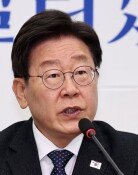Tears of the fire-ravaged market in Daegu
Tears of the fire-ravaged market in Daegu
Posted December. 02, 2016 07:14,
Updated December. 02, 2016 07:23
In 1601 after the Imjin War, or the Japanese invasion of Korea, ended, Japanese governor stationed at the Gyeongsang Provincial Office in Daegu City. As the city was developed into an administrative hub in the Yeongnam region, economic transactions also became active in the area. Once called “Daegu Market,” the traditional market was held outside the north gate of Daegu Castle. However, it was renamed as Seomun Market after being moved to the outskirts of west gate of the Gyeongsang Provincial Office in 1679 under the reign of King Sukjong. In the late Joseon Dynasty, Seomun Market was listed as the top three markets, along with Pyongyang and Ganggyeong markets.
As many merchants of the market took the streets during the March 1 Independence Movement in 1919, the Japanese colonial government relocated the market to the current place to prevent crowds from joining demonstrations. Economy was slow in the streets of Seomun Market just after it was relocated, but the market was soon back on track. After Korea's liberation from Japan's colonial rule in 1945, the market became the nation’s largest market filled with linen, cotton, and iron goods wholesalers backed by fabric and textile industry in Daegu. The market has been crowded with around 4,600 stores with over 200,000 merchants. During the election period, presidential candidates from both ruling and opposition parties used to come here when visiting Daegu.
Seomun Market went through several fire accidents until now. For the last two decades after liberation, six big and small fires burnt the market in 1952, 1960, 1961, and 1967. The most recent one occurred eleven years ago when a big fire started burnt down around 1,190 stores in December 2005. Still, an average 40,000 to 50,000 and 100,000 visitors visit on weekdays and weekends, respectively. In particular, the market is in its “second heyday” thanks to its much talked-about permanent night market opened in June.
The fire broke out in early Wednesday morning has turned around 670 shops in the market's fourth district into ashes. Merchants who stocked their inventories full of goods to meet high demands in the upcoming year-end have been devastated and have to endure a colder winter this year. The blaze is highly likely to be accidental, but there are still possibilities of arson given that it happened so suddenly around 2 a.m. when there was hardly anyone around. The government and the Daegu Metropolitan Office must concentrate their efforts on investigating the causes and at the same time repair the damages and provide support to console the merchants deeply in sorrows after the unexpected crisis.
shkwon@donga.com







